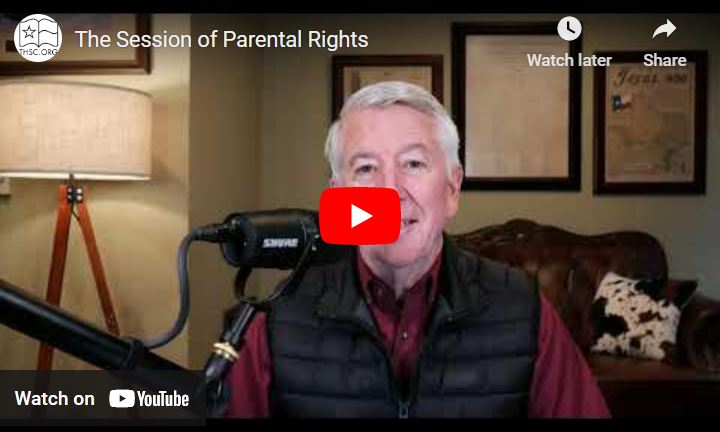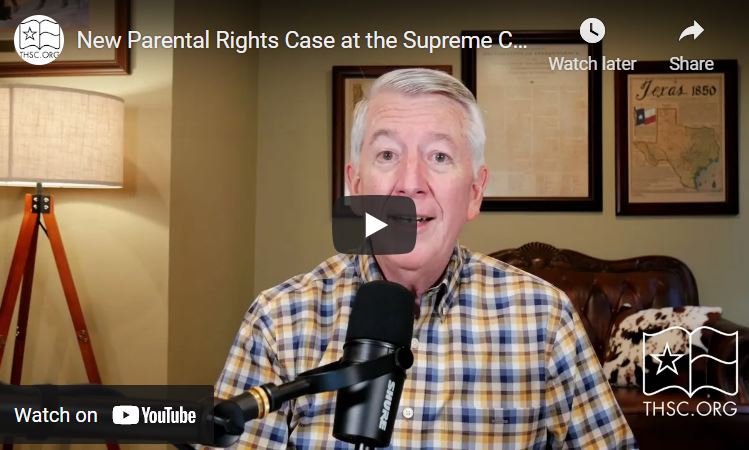
Last month, another important case dealing with the rights of Texas families came to a positive conclusion.
The Court Case Details
Back in April of this year, THSC filed an important brief in a case at the Supreme Court of Texas (SCOTX) where a father was battling for his right to raise his daughter. On August 27, that case officially concluded in a victory for the father and his daughter.
In an example of the courts abusing their power over families, the father had found himself partially separated from his daughter even though nobody had accused him of being a bad father.
In October 2020, a court in Rockwall county ordered that the father, who was separated from the child’s mother but was still raising his daughter during his periods of possession, had to share custody of his daughter with his in-laws.
The in-laws argued that they were entitled to partial custody because the child had lived with them for more than six months while the child’s mother had been unable to care for her during her periods of possession.
The Father’s Situation
Nobody questioned the father’s current capability to sufficiently raise his daughter. Rather, they argued that the father’s past mistakes, which had since been remedied, justified forcing him to share custody of his daughter with non-parents.
In 2016, the father had checked himself into a drug rehabilitation program to address addiction problems. After completing the program in the fall of 2016, the father had remained free from addiction, landed a stable job, turned his life around, and participated fully in raising his daughter.
After the two parents had separated, the father shared approximately 50/50 custody of his daughter with the child’s mother.
Is It About Good Parenting?
While no party cited concerns about the father’s raising of his daughter or his abilities as a parent, the fact that the father had past mistakes on his record from five years ago was used to argue that he didn’t deserve full parenting rights over his daughter.
Reading between the lines, one has to conclude that good parenting doesn’t necessarily make you a good parent in the court’s eyes. If you’ve made mistakes in the past, even mistakes that you have since remedied, that might be enough to remove your parental rights. In other words, it’s not about how well you are doing. It’s about what you have done at any time in the past.
THSC Takes Action
The legal context for the father’s battle actually starts with a different victory at the Supreme Court of Texas (SCOTX) in 2020 which THSC was instrumental in achieving. In that case, known widely as the #LetHerStay case, the SCOTX issued a unanimous opinion declaring that parents have a fundamental right to raise their children and that a judge must presume that a parent is acting in the best interest of their child.
That court decision from 2020 is now binding on all similar cases in Texas.
Fast forward now to 2021. New case, new family, strikingly similar problem. The father’s attorney filed a special appeal to the Dallas Court of Appeals asking for the appellate court to intervene and protect the father’s rights. The attorney argued that, as the SCOTX had stated in 2020, the court had to presume that the father was a fit parent unless substantial evidence was presented to prove otherwise.
To the surprise of many legal experts watching the case, the Dallas Court of Appeals ruled that, while fit parents have the right to raise their child, the SCOTX had not clarified how much evidence was required before a court could find that parent unfit and restrict parental rights.
The Court of Appeals posited that the father’s five years prior, self-resolved drug problem could be enough to prove that he no longer deserved the right to raise his own daughter, even if he had been successfully doing so for years.
As the case headed to the SCOTX, THSC filed a brief with the SCOTX arguing that only evidence showing that the parent’s actions had caused significant harm to the child would be sufficient to justify the restriction of a parent’s right to raise their child.
The Texas Association of Family Defense Attorneys (TAFDA), led by former homeschool mom Julie Hatcher, also filed a brief defending the father.
However, before the SCOTX could make a decision, the district judge who originally ordered that the father share custody of his daughter with his in-laws had a change of heart and reversed his bad decision, returning full custody of the daughter to her father.
Attorneys involved in the case believe that the pressure created by the legal fight brewing at the SCOTX and the intervention of organizations like THSC and TAFDA was instrumental in facilitating the judge’s change of heart.
The Parent is Fit From the Start
While this outcome is a great victory for the father and daughter, it highlights a legal problem that the SCOTX will eventually have to tackle. In 2020 the court clarified in a unanimous opinion that a judge cannot unilaterally overrule the decisions of a fit parent. A judge must start by presuming that the parent is a fit parent and that their decisions are in their child’s best interests.
However, the question that the court will now have to tackle directly is how much evidence has to be produced before a judge is allowed to limit that parent’s rights? If five year old mistakes that the parent has solved of their own accord make a person unfit to raise their child, the implications for the average parent in Texas are significant.
Since the SCOTX did not issue an opinion in this case clarifying the issue, it is certain to come up repeatedly until that clarity is provided. THSC’s legal team is watching for cases dealing with this important legal issue and stands ready to intervene again to protect the rights of families in Texas.
In the meantime, we celebrate the great victory for this father and his daughter to be fully reunited!
We support the rights of parents to raise their children in the way they see fit!
Join us today and help lift up other families and secure their God-given rights.











